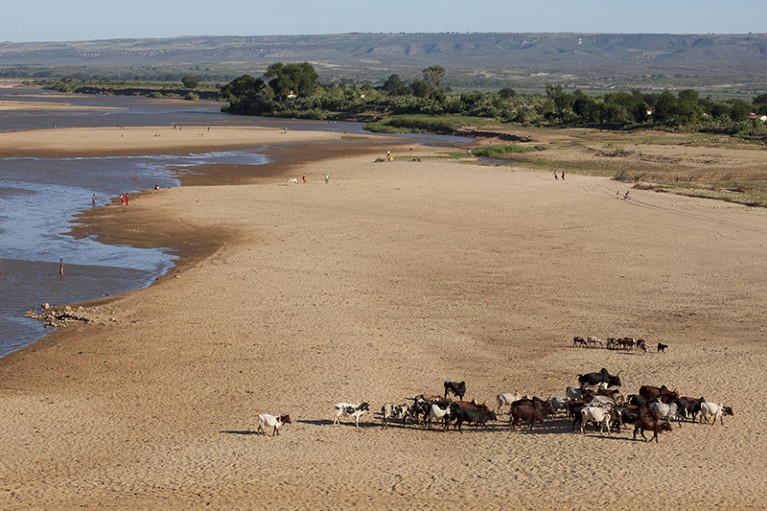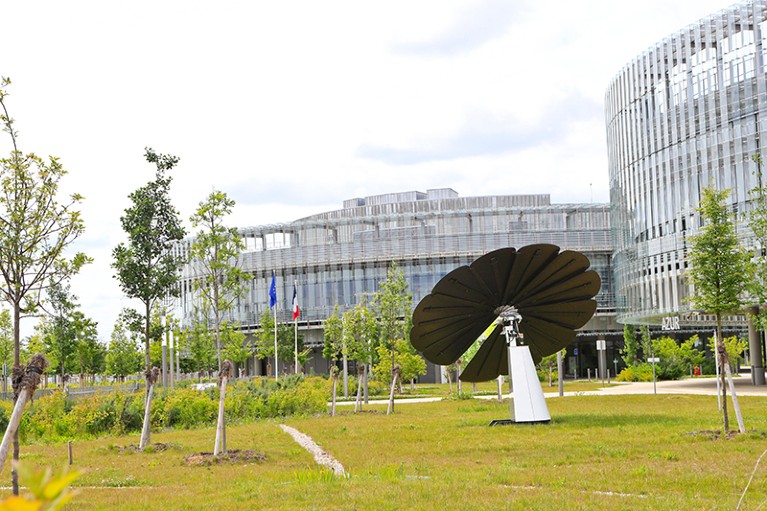CLIMATE
Frozen records Arctic sea ice reached its peak winter extent on 17 March, marking the second-lowest maximum in the 39-year satellite record. At 14.48 million square kilometres, this year’s peak is just 0.4% above last year’s record-low maximum extent. The four lowest maxima all happened in the past four years, the US National Snow and Ice Data Center said on 23 March. This winter saw parts of the Arctic freezing up relatively late, followed by warm air temperatures throughout much of the season.
Weather costs for 2017 break records The costs of severe weather and climate events hit a record high of US$320 billion in 2017, the World Meteorological Association (WMO) said in its annual state-of-the-climate report on 22 March. The bulk of the bill — some $265 billion — was attributable to damages in the United States from hurricanes Harvey, Irma and Maria. The WMO also cited the costs of monsoon flooding in Asia and drought in eastern Africa (pictured, the dry Mandrare River in Madagascar). Overall, 2017 was the third-hottest year on record, with global average temperatures at roughly 1.1 °C above the pre-industrial average, according to the report. The nine warmest years on record have all occurred since 2005.

Credit: Melanie Stetson Freeman/The Christian Science Monitor via Getty Images
EVENTS
Brexit deal urged UK politicians have urged the government to make an early deal with the European Union on science. Members of Parliament on the House of Commons Science and Technology Committee warned that post-Brexit arrangements for research and innovation could become a bargaining chip in wider trade negotiations unless research talks are made an urgent priority. Leaving a deal on science until later in the year risks damaging the United Kingdom’s status “as a science superpower”, they argued in a report published on 19 March. Leading concerns include clarifying whether the government will seek to join the European Commission’s next research-funding programme, and whether there will be special immigration arrangements for scientists.
Whale stranding Roughly 150 short-finned pilot whales (Globicephala macrorhynchus) were found stranded on an Australian beach 315 kilometres south of Perth on the morning of 23 March. Animal workers and volunteers were able to rescue and release just seven whales back to deeper waters by nightfall; the rest died. Three whales that had been released returned to the beach the following day; they were humanely killed. All but two of the dead whales have been removed from the beach at Hamelin Bay, near the continent’s southwestern tip. The area was also the site of a stranding of 87 pilot whales and dolphins in 2009.
SPACE
Exoplanet probe The European Space Agency will launch the world’s first space telescope dedicated to studying the atmospheres of exoplanets, after it selected the mission for development on 20 March. The mission, called Atmospheric Remote-sensing Infrared Exoplanet Large-survey (ARIEL), will probe more than 1,000 known exoplanet systems.
HEALTH
Yellow-fever rise In response to an unusually severe outbreak of yellow fever, Brazil’s health minister Ricardo Barros announced on 20 March that the government intends to vaccinate the country’s entire population against the disease. Since July 2017, the virus has infected 920 people and killed 300. Officials recorded 196 deaths over the same period in the previous year. The decision to expand yellow-fever vaccinations was not made sooner because it is not without risk: one recipient in 100,000 develops dangerous reactions, such as hepatitis. The government hopes that, by April 2019, it will have reached the 78 million people who remain unvaccinated.
Guinea worm South Sudan has ended the spread of Guinea-worm disease within its borders, leaving Chad and Ethiopia as the only two countries with ongoing spread of the debilitating parasitic infection. South Sudan has gone 15 consecutive months — longer than the worm’s life cycle — without recording a case, said the Carter Center in Atlanta, Georgia, on 21 March; the organization is leading a global effort to eradicate Guinea worm. The World Health Organization in Geneva, Switzerland, must still certify that the disease has been eradicated in South Sudan, which involves a much longer process. Kenya was deemed free of Guinea worm only in February, despite last recording a case in 1994.
UNIVERSITIES
Science campus The French government has endorsed an international panel’s recommendation to delay for 30 months a decision on whether to give permanent ‘excellence’ status to the Paris-Saclay University cluster, part of the Saclay science super-campus southwest of Paris (pictured). The newly established cluster, a grouping of 14 institutions, has temporary excellence status under the government’s IDEX initiative and receives €30 million (US$37 million) in funding a year; permanent status would guarantee that income. The cluster has been on probation since 2012, and must become an integrated establishment by the 2020 academic year, the panel said. The Saclay science project initially aimed to bring some 20 research and teaching institutions under one umbrella. But progress was stalled by reluctance from elite institutions known as grandes écoles to give up their names and autonomy. Last October, President Emmanuel Macron announced that the project would proceed with two clusters: one called Paris-Saclay University, the other called NewUni.

The Paris-Saclay science campus southwest of the French capital is home to several teaching and research institutions.Credit: vicar/Alamy
FUNDING
US budget deal Nearly all US science agencies would see their budgets grow in 2018, under a US$1.3-trillion deal that President Donald Trump signed into law on 23 March. The legislation, which funds government operations up to 30 September, would boost funding for the National Institutes of Health to $37 billion, $3 billion above the 2017 level. The National Science Foundation would get $7.8 billion, up $295 million, and NASA’s budget would rise by $1.1 billion, to $20.7 billion. For the second year running, lawmakers in Congress ignored the steep cuts to science agencies sought by Trump.
ENVIRONMENT
Declining diversity Human activities are threatening the security of food and clean water by causing a rapid decline in the variety of plants and animals on Earth, according to United Nations-backed assessments released on 23 March. Conducted by more than 500 experts across 100 countries, the 3-year study looked at all areas of the world except the poles and the open ocean. Researchers found that in nearly every region, pollution, climate change and unsustainable exploitation of natural resources are endangering biodiversity. The assessments estimate that if the situation continues as it is, by 2050 there will be no exploitable fish stocks in the Asia-Pacific region, and the Americas will lose 40% of their biodiversity.
PEOPLE
Public-health chief HIV researcher Robert Redfield will lead the US Centers for Disease Control and Prevention (CDC), the secretary of health and human services, Alex Azar, announced on 21 March. Redfield “has dedicated his entire life to promoting public health and providing compassionate care to his patients”, Azar said in a statement. Redfield, co-director of the Institute of Human Virology at the University of Maryland in Baltimore, has studied HIV epidemiology, pathology and vaccines for over 30 years. He replaces Brenda Fitzgerald, who resigned on 31 January following news reports that she had traded stock in tobacco companies while leading the agency.
FACILITIES
Sports brain bank Australia’s first bank for collecting the brains of sportspeople opened on 27 March. The Australian Sports Brain Bank will enable research into chronic traumatic encephalopathy. The condition affects people with a history of repeated brain injury, such as those who have played contact sports, and military veterans. The bank, a joint initiative of the University of Sydney’s Brain and Mind Centre and the city’s Royal Prince Alfred Hospital, has so far received donation pledges from six Australian former sports professionals. It will also collect brains from people who haven’t played sport professionally.
TREND WATCH
Facebook users routinely encounter science-related information in practical, ‘news you can use’ posts or in advertisements. A study by the Pew Research Center in Washington DC analysed 6,582 posts randomly selected from 30 science-related Facebook pages. Nearly 30% were directly about scientific discoveries, whereas 21% were ‘news you can use’ and 16% were promotions. The study found that visual posts, such as videos or images with little text, received most engagement.

Source: Pew Research Center






